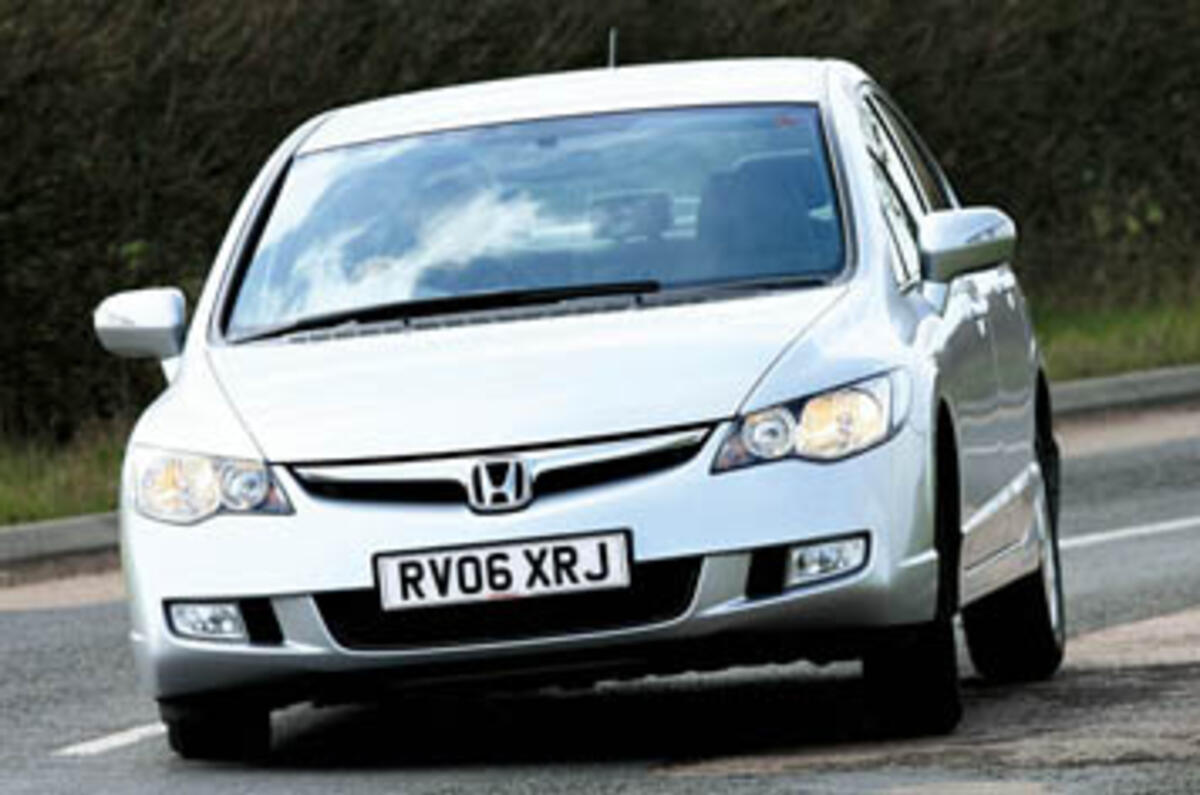What's new? Honda’s a straight company when it comes to environmentalism. And it’s pretty handy at making petrol engines. It opposed the mandatory introduction of catalytic converters because it reckoned it could make cleaner engines without them, just by burning fuel more efficiently. It has never made a two-stroke marine engine (generally considered dirtier than four strokes), and in the past few years has put the kibosh on all of its motorbike two-strokes.So when Honda says that the medium-term solution to producing cleaner cars is hybrid technology, it may be right. Hydrogen fuel cells are the future, it says, but for the moment forget alternative fuels: petrol engines backed by electric motors are the way forward.Which brings us to the latest Civic Hybrid. Or at least it would if this was the all-new European Civic hatchback, as built in Swindon. But it isn’t: this is the Civic four-door, built in Japan and significantly different in architecture to the European Civic. This one’s still got double wishbones at the back, rather than a torsion beam, see, although both models now get MacPherson struts up front.What's it like? Inside, things are much more familiar: there’s a two-tier dash with digital speedo at the top and an analogue rev-counter behind the small steering wheel that is less adjustable than its hatchback counterpart’s. The driving position isn’t as good as the hatch’s, either.But there are respectable amounts of space for all passengers and there’s a 350-litre boot. That’s 150 litres shy of a Ford Focus saloon’s but then there is a stack of batteries back there. Toyota’s Prius – the Civic IMA’s most natural rival – has 408 litres, plus the versatility of being a hatch.Otherwise, the Civic and Prius are reasonably closely matched on specification. Honda claims 0-62mph in 12.1sec, 115mph flat out, 61.4mpg and CO2 emissions of 109g/km. The Toyota’s respective numbers are 10.9sec, 106mph, 65.7mpg and 104g/km.Under the bonnet, the two cars’ principles are like peas in a pod. Both have small, clean petrol engines mated to continuously variable auto transmissions, and electric motors that also act as dynamos under braking, charging the aforementioned batteries.Under braking or when dawdling on electric power only, the Civic’s twin-spark-plugged, i-VTEC engine’s valves close and the motor continues to turn over, expending energy through friction, albeit not using any petrol. Only when the Civic is stationary does its engine shut down completely. It’s not an entirely smooth transition. Stop and the rev-counter goes flat and all becomes quiet. Lift your foot from the brake, the car starts to creep and there’s a noticeable nudge as the engine fires.Underway, the Prius is quieter and its more powerful electric motor (67bhp compared to the Civic’s 20bhp) is happier to provide the sole drive around town. Not that the Civic is unrefined: wind and road noise is kept to acceptable levels and, at a cruise or under light acceleration, the 1339cc petrol engine is relatively hushed. Ask for a lot of acceleration, though, and it’s boomy – louder than a Prius, and with less-impressive acceleration. In terms of drivetrain refinement, the Toyota gets the nod.But not when it comes to enjoyment. The Civic is no driver’s car, but it corners neatly, with quick and accurate, if lifeless, steering and decent agility. But this is not a fun car: it’s more entertaining than a Prius in the same way that eating liver is preferable to eating fish heads.Should I buy one? Still, when it comes to price, the Honda does have the advantage. At £16,300 (£17,100 with leather), it’s cheaper than the Toyota by £1500. The cynics will say ‘don’t believe the hype. Our diesels are even cheaper, more fuel efficient, put out less CO2, and are faster’. But surely good old honest Honda’s right, you think, as you flick through its ‘green’ press pack, made from recycled elephant dung and old tyres. And then you realise that all the printed information inside it is entirely replicated on a CD stored at the back, rendering the rest of it a total folly. Perhaps the cynics have got a point after all.
Honda's Civic Hybrid is much faster than the IMA and more fun to drive than the Prius. It lacks the refinement of the Toyota, but is cheaper to buy.
Close
Back to top






















Add your comment